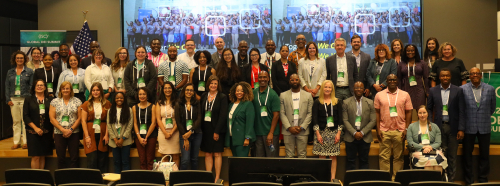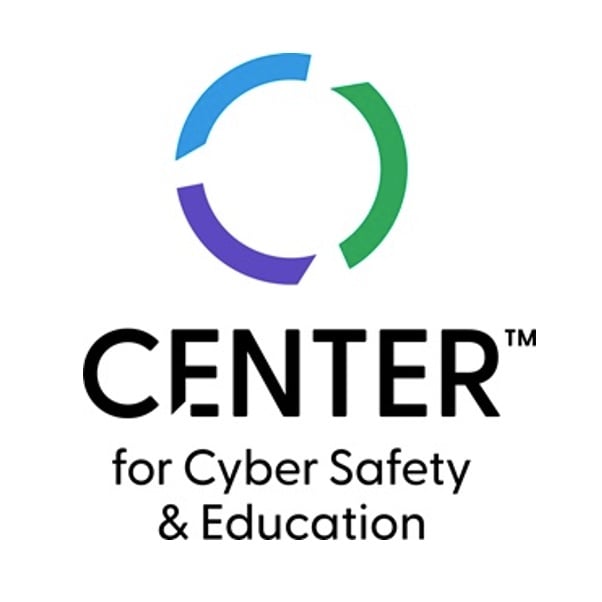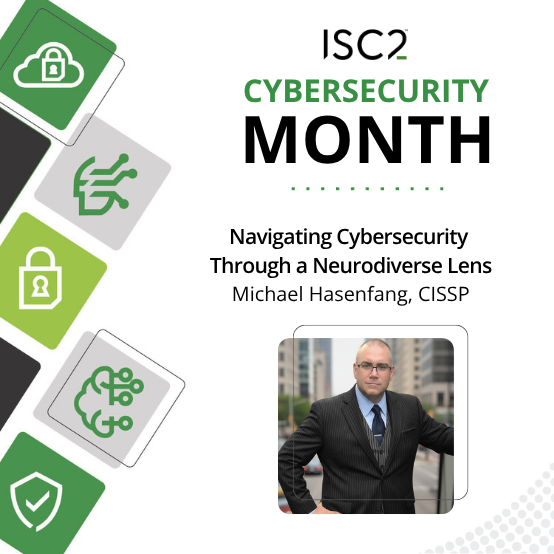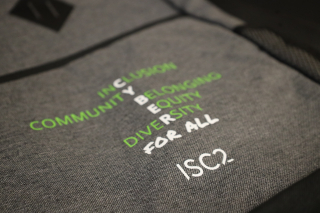 ISC2 held its first annual global DEI summit on Wednesday, July 12, at George Mason University in Arlington, Virginia. The theme of the in-person summit, "Amplifying Our Impact: Advancing DEIB in Cybersecurity," brought cybersecurity leaders together to discuss how they can ensure the cyber ecosystem is a more diverse, equitable, and inclusive space for incoming and existing talent.
ISC2 held its first annual global DEI summit on Wednesday, July 12, at George Mason University in Arlington, Virginia. The theme of the in-person summit, "Amplifying Our Impact: Advancing DEIB in Cybersecurity," brought cybersecurity leaders together to discuss how they can ensure the cyber ecosystem is a more diverse, equitable, and inclusive space for incoming and existing talent.
The all-day event fostered a unique opportunity for professionals in the government, nonprofits, academia and the private industry to learn insightful information from peers who hail from places around the world, such as Australia, Europe, and Africa. Attendees gained a deeper understanding of how networking, brainstorming, and collaboration are crucial to success during the event. They also developed innovative methods to support and advance ISC2's DEI vision.
Explore a recap and highlights from the global summit below:
Welcome & Introduction of Opening Keynote: Speaker: Clar Rosso, CEO, ISC2
CEO of ISC2, Clar Rosso, opened the summit by welcoming and showing gratitude to attendees. She expressed how, since everyone comes from different backgrounds, cultures, and experiences, she has no doubt that diversity will be key in driving innovation and change. Rosso shared her own story that made her who she is today. She talked about her upbringing as the only girl of five children and how she believed she was as worthy and capable as her brothers despite the world not thinking the same.
Her experiences grappling with issues such as workplace discrimination, inequity, and non-inclusivity inspired her to spearhead a Diversity, Equity, and Inclusion (DEI) team for ISC2, which has helped the company make significant advances in the cyber world.
“These experiences and all of yours have ignited my passion for driving change in diversity, inclusion, equity, and belonging,” Rosso said. “Increasing and amplifying the organization's DEI efforts was one of the first things I did when I joined ISC2 almost three years ago.”
Opening Keynote Speaker: Dr. Tarika Barrett, CEO, Girls Who Code
Dr. Tarika Barrett, CEO of Girls Who Code, followed Rosso’s introduction as the opening keynote speaker. She said hearing Rosso’s story meant so much to her, and she shared her own story with the audience.
Dr. Barrett spoke about her family's upbringing in Jamaica. Her mom was the first in their family to attend college and get a graduate degree. She said she is still amazed by her mother's accomplishments since her grandmother, affectionately known as "Mama," was forced to drop out of school after her mother died to help raise her seven younger siblings.
"Even though Mama's own schooling had been cut short, she somehow understood that education could pry open the doors of opportunity," Dr. Barrett said. "...My grandmother, a farm girl with a sixth-grade education, instilled in her children and her children's children a deep reverence for learning."
Two generations later, her grandmother's view toward education led her to become the CEO of Girls Who Code. The organization offers girls from elementary school to college the opportunity to learn how to code. Through Girls Who Code, Dr. Barrett wants to close the gender gap in STEM and dispel the cultural message that a career in the field isn’t for girls, women, and non-binary people. She believes creating opportunities, forging partnerships, advocating for more representation in the media, and providing mentorship are a few ways to address the issue.
“If we can agree to these things, I promise you we will see the gender gap close, and we should all be excited about what this means for our society,” Dr. Barrett said. “Because when girls learn to code, they don't just become coders. They become change makers.”
Measuring Inclusion to Drive Meaningful Change: Paolo Gaudiano, Co-founder, Aleria
Paolo Gaudiano, the co-founder of Aleria, presented DEI research that relates to the importance of creating inclusive workplaces. Aleria measures inclusion to help organizations pinpoint opportunities for greater employee satisfaction, diversity and inclusion, and performance through quantitative information.
Gaudiano spoke about how, most of the time, companies focus more on diversity and representation rather than inclusion, which he thinks is a problem. He calls this concept the “DEI Disconnect.”
He shared why inclusion is such a critical aspect of satisfaction and how it determines the success and performance of organizations.
“One of the things that has been an obstacle is the fact that inclusion is invisible,” Gaudiano said during his presentation. “But as I’ve shown you [attendees], you can actually measure exclusion and use that to guide your decisions. I believe that actually measuring inclusion is absolutely crucial as an ingredient to drive meaningful change.”
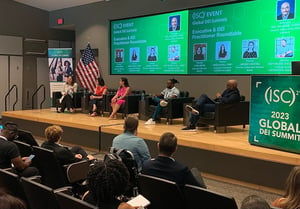 Executive & DEI Practitioner Roundtable:
Executive & DEI Practitioner Roundtable:
M.K. Palmore, CISSP, the director of the office of the CISO at Google, served as the moderator of the first roundtable called "The Executive & DEI Practitioner Roundtable" at the summit.
Panelists included:
- Lynn Dohm, Executive Director, WiCyS
- Angela Hill, PMP, Founder & President, Latinas in Cyber
- Safi Mojidi, DSc, CISSP, Founder, Hacking the Workforce
- Jacqui Loustau, Founder & Executive Director Australian Women in Security Network
Each panelist spoke about the best DEI practices they’ve implemented through their organizations and how they’ve seen the cyber world evolve through a nonprofit lens.
They talked about the impact their organizations' communities have made in marshaling resources and mentorship, garnering corporate and industry support, and providing access to opportunities, which has driven positive change for diverse talent in the workplace.
“We have that ecosystem of the collective strength of our messaging in our community because we all have a very niche area on how we're contributing to the workforce,” said Dohm as she spoke about the importance of partnerships. “But when the ecosystem of this multi-organizational approach is put into effect, the value of all the good work that we're doing continues to be amplified.”
During the panel, Mojidi also addressed what his organization is doing to build community. He also shared how the organization is working to break down the demystification of taking the traditional route or fulfilling academic requirements to enter cybersecurity.
“I know there are so many people who I've worked with and for who have had either less or equivalent security background,” Mojidi said. “The traditional route is not necessarily an indicator of how good they are at their job.”
“...And it is something I think culturally that kind of lives within a lot of us, that we don't think that we're good enough,” he added. “A lot of what we do at Hacking the Workforce is help people become their own biggest advocates by helping people understand how to talk about themselves in a positive manner and identify those transferable skills.”
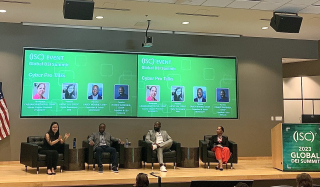 Cyber Pro Talks
Cyber Pro Talks
Cassandra Dacus, CISSP, Atlanta Chapter President of Cyversity moderated the second group discussion.
Panelists included:
- Kathy Liu, MPA, CIPP/C Digital Sovereignty, AWS
- Casey Morris, CISSP, Consultant and Certified Trainer, Microsoft
- Romeo Gardner, CISSP, President & CEO, NEHLOS
Each panelist talked about their career experiences- both challenges and opportunities - as diverse cybersecurity professionals. They discussed unique insights on topics such as the value of mentorship, overcoming hardships, and imposter syndrome.
Liu shared how she is helping nonSTEM students transfer their skills, knowledge, and abilities into cyber through her organization, The Inclusive Cyber Project.
Morris spoke about his organization, Black Tech DFW, which creates pathways for Black people in Dallas to enter tech. Through its efforts, the organization goes out into the community and provides people with digital resources, training programs, and more.
Gardner, who also worked at Microsoft, shared his unique career journey transitioning from being a musician to getting into cybersecurity. He shared how his hiring process to become a program manager at Microsoft profoundly affected him. After his interview for the position, he learned that he was a diversity hire, which upset him almost to the point where he contemplated taking the job.
"My mentor said, 'Why wouldn't you for all those doors that have already been closed? "Gardner revealed during the panel. "'You need to show up so that other people can see that you can do this. That you can actually go out and have an impact.'"
"So that was my real turning point, that I actually need to stop feeling like this," he added. "I could do this job. There was a bit of imposter syndrome there. That helped me to gain more confidence within the cybersecurity realm."
Closing Keynote Session Speaker: Confidence Staveley, Executive Director, CyberSafe Foundation
Confidence Staveley, the Founder and Executive Director of CyberSafe Foundation, ended the summit's sessions by sharing DEI insight on tech and cybersecurity from a global perspective.
She spoke about how she developed a passion for computers as a young girl when she attended computer school. Even though her parents dreamed of her becoming a medical doctor, she convinced them that tech was the right path for her.
Her experience at computer school opened a door for opportunity. She realized that while talent like herself is equally distributed, “opportunity” is not.
Staveley's CyberGirls program is currently Africa's biggest mentorship and training program for young women on the continent. She believes everyone in the tech industry should create abundant opportunities for girls like herself and people from different backgrounds.
Through her work and global conversations, Staveley also highlighted three major barriers people face worldwide. They include:
- Many women do not believe they belong in cybersecurity.
- Access shortage to resources such as devices, learning materials and mentors.
- The lack of representation.
Staveley is actively working to dismantle these barriers through her foundation since she believes diversity is the best defense tool to protect the digital world.
"Diversity, equity, and inclusion is not just a moral imperative, and it's not just a nice thing to do that makes you look good," Staveley said." It's actually a business imperative. And why do I say so? It's because long-term success for most businesses today and tomorrow will depend on how diverse the workforce is."
“It’s only with diversity that innovation is really going to happen,” she added.
Advocacy, representation, and community were the common themes that talent discussed throughout the summit. As Rosso closed the summit with an interactive activity, she asked every attendee to tell the audience one word that described their day. Some words included inspirational, insightful, impressive, elaborative, and exhilarating.
These words affirm that the future of diversity, equity, and inclusion in cybersecurity is bright. And, just as Staveley encouraged everyone to say at the end of her speech, "Together we can. Together we will."
